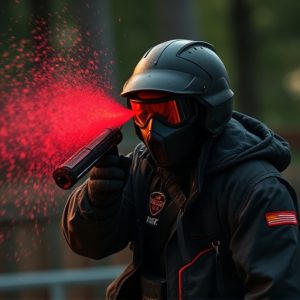Evaluating the Impact of Pepper Spray on Vision: Can It Cause Temporary Blindness?
Pepper spray, which contains oleoresin capsicum (ORC), is a non-lethal self-defense tool that cause…….
Pepper spray, which contains oleoresin capsicum (ORC), is a non-lethal self-defense tool that causes intense irritation upon contact with mucous membranes and skin. When directed at an assailant's face, it triggers the trigeminal nerves, leading to a rapid onset of burning sensations and reflexive eye closures, resulting in temporary blindness due to the severe pain and discomfort. This effect typically subsides within 30 to 45 minutes with exposure to air and can be alleviated by water. The intensity of its impact depends on factors such as concentration, proximity, duration of exposure, environmental conditions, and individual sensitivity. Contrary to myths, it does not cause permanent blindness; rather, it provides a temporary incapacitation that allows for escape or intervention by law enforcement. Users must understand these dynamics to employ pepper spray safely and effectively in self-defense situations, keeping in mind its effects on both the assailant and surrounding areas.
When confronted with the question, “Can pepper spray blind you?” it’s crucial to delve into the potent effects this defense mechanism can have on vision. This article dissects the capabilities and limitations of pepper spray, offering a clear perspective on its impact. We explore the science behind pepper spray, how it operates to temporarily incapacitate, and the variables that influence its visual effects. Join us as we shed light on whether pepper spray can lead to temporary blindness or significant vision impairment.
Understanding Pepper Spray and Its Effects on Vision
Pepper spray, a popular self-defense tool, is designed to incapacitate an assailant by causing intense irritation to their eyes and respiratory system. The active ingredient in pepper spray, oleoresin capsicum (ORC), triggers a cascade of physiological responses when it comes into contact with the mucous membranes of the eyes. When sprayed directly into someone’s eyes, the effects can be immediate and debilitating, leading to a temporary blindness known as “flash-blindness.” This condition is characterized by an inability to see clearly for several seconds due to the intense burning sensation caused by the spray. While this does not literally “blind” the person in a permanent or long-term sense, it significantly impairs vision to the extent that the individual cannot effectively see to continue a physical altercation. The effects on vision are primarily short-term and include severe pain, involuntary closing of the eyelids due to the irritant, lacrimation (excessive tearing), and temporary blindness as the eyes struggle to cope with the overwhelming stimuli.
The intensity of the impact pepper spray has on vision can vary based on several factors, including the concentration of the spray, the distance from which it is deployed, the amount used, environmental conditions like wind, and individual differences in sensitivity. It’s important for users to understand that while pepper spray can temporarily impair vision, it is not a foolproof means of permanently blinding an attacker. The effects are designed to provide a window of opportunity for escape or for law enforcement to intervene. Therefore, when considering the use of pepper spray for self-defense, one should be aware of its potential impact on vision and the temporary yet significant impairment it can cause. Understanding the limitations and effects of pepper spray is crucial for anyone who carries this defense mechanism to ensure safe and effective use in critical situations.
The Mechanism of Pepper Spray and Potential for Temporary Blindness
Pepper spray, a popular self-defense tool, is a form of non-lethal chemical weapon capable of temporarily incapacitating an assailant. It contains oleoresin capsicum (OC), which induces a potent irritant effect upon contact with mucous membranes and skin. When deployed, the fine particulate of pepper spray comes into contact with the eyes, it immediately stimulates trigeminal nerve endings, causing intense burning and pain. The mechanism behind its disabling effects is the rapid influx of capsaicin, the active component in chili peppers, into these tissues. This triggers a series of physiological responses that include the release of neurotransmitters like Substance P, which intensifies the sensation of pain and causes lacrimation, conjunctival redness, and mucous production. In extreme cases, the irritant can cause temporary blindness by closing the eyelids reflexively due to the intense discomfort, effectively shutting out light for a period. However, it’s important to clarify that while pepper spray can lead to a state akin to blindness through involuntary eyelid closure and the inability to see clearly during the irritation, it does not permanently damage the eyes or result in permanent blindness. The effects are temporary and typically subside within 30 to 45 minutes after exposure to fresh air and fluids, assuming no underlying eye conditions that could be exacerbated by the spray. Users of pepper spray should always be aware of their surroundings and the potential consequences of deploying the spray to ensure safety for both themselves and others in proximity.
Factors Influencing the Impact of Pepper Spray on Visual Capacity
The question of whether pepper spray can render a person temporarily blind is multifaceted, with several factors influencing its impact on visual capacity. Pepper spray, also known as oleoresin capsicum (ORC), is a form of non-lethal chemical munition used for defense against unarmed attackers or to subdue suspects during police work. The severity of the effects of pepper spray on eyes depends on several key elements, including the concentration of the spray, the proximity to the target, the duration of exposure, and individual differences in sensitivity. For instance, a higher concentration of capsaicin, the active component in pepper spray, can lead to more intense irritation. Additionally, if the spray directly contacts the eyes without dilution, it can cause immediate burning, tears, and involuntary closure of the eyelids, significantly impairing vision. The duration of exposure is also critical; a longer contact with the spray increases the likelihood and degree of visual incapacitation. Moreover, individual factors such as pre-existing eye conditions, the presence of contact lenses, and varying degrees of tolerance to capsaicin can affect how pepper spray affects an individual’s eyesight. Understanding these factors is crucial for both personal safety strategies and the responsible use of pepper spray as a defense mechanism. It is important to note that while pepper spray can severely impair vision, it does not cause permanent blindness; effects are typically temporary and resolve upon flushing the eyes with water.


